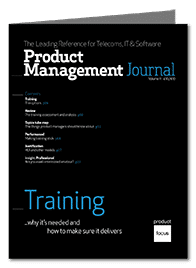Ask your mother to name a profession. I bet she comes up with a lawyer, a doctor, or an accountant. She’s unlikely to say a product manager.
Part of the reason is that not many people know what product managers do. Sometimes we aren’t even sure ourselves! And how it’s done varies from company to company. So managers find it difficult to know if it’s being successful. They think – we don’t really understand this, we’ve muddled through so far so we’ll just do more of the same.
You can read all the articles in our Product Management Journal – Training by signing up for free here.

The word professional implies that you are an expert. You care about the quality of the work you do. You’ve been trained, and you can be relied upon to do things to a certain standard. You keep your knowledge up to date. It matters a lot if you get things wrong. As a professional, you know your trade.
But most of us drift into product management with little or no formal training. The expectation is that we can just pick things up on the job. We learn by trial and error, what little we’ve seen elsewhere, and what our colleagues say we should do.
Over the last 10 years, things have changed. Product management is becoming a profession. There is a body of knowledge about what works and what doesn’t. We don’t need to re-invent the wheel each time we do something. There is best practice, training courses, books, and journals.
If a doctor said before your operation, “I haven’t had any training on this, but I’m sure I’ll be able to pick it up on the job,” would you let him go ahead? Why is it so different for a product launch with a huge investment at stake?
If your accountant said, “I’ve been practicing for 10 years but haven’t bothered keeping up to date with changes in the law and best practice,” would you risk letting her do your accounts? Why is it so different from learning how to price your company’s products effectively?
For too, long product management has been seen as a job rather than a profession. It’s time to stop being an amateur and become a professional. Invest in some training.


